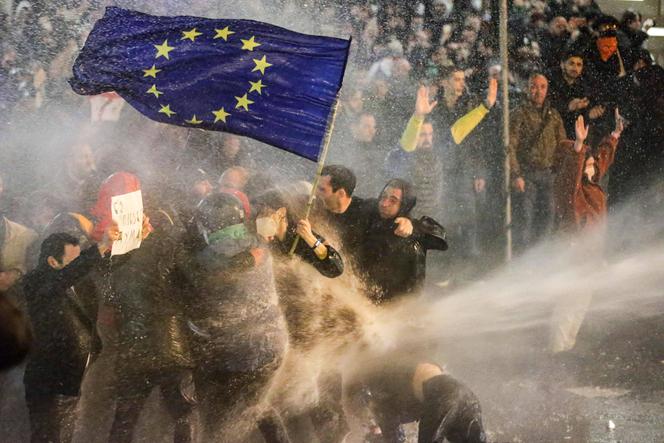


A year ago, Georgia's ruling party triggered a national and international scandal with its controversial draft law on "foreign agents." Modeled on Russian law and condemned in both Brussels and Washington, the bill aimed to muzzle the country's independent press and civil society, in an authoritarian move that jeopardized its integration into the European Union. The government finally abandoned the bill, after sustained pressure and massive demonstrations, on March 9, 2023. Now, six months ahead of the legislative elections scheduled for October, it is back.
The parliamentary majority leader of the ruling Georgian Dream party, Mamuka Mdinaradze, announced on Wednesday, April 3, that the bill would be reintroduced to parliament. The content of the text remains the same, only the name has changed, the official said. The term "foreign agent" has been removed and replaced by "organization serving the interests of a foreign power."
The bill obliges organizations that receive at least 20% of foreign funding to register under this name and publish an annual financial report, or face heavy fines. The ruling party, close to Moscow, believes that "the civil sector remains the most opaque sector in Georgia" and accuses donors to civil society organizations of "financing extremism."
Taking a propaganda page out of Moscow's book, the Georgian Dream party, founded by oligarch and ex-prime minister Bidzina Ivanishvili, notably accuses these NGOs of spreading "pseudo-liberal ideology and LGBT propaganda," and of conducting "campaigns aimed at undermining public confidence in the Georgian Orthodox Church." In a statement released on Wednesday, he also accused them of calling on Georgia to "attack Russia" and "get involved in the war," a recurrent discourse from the authorities since the start of Russia's invasion of Ukraine.
The new bill has not yet been made public, but observers warn that it could be used to put pressure on civil society organizations and place them under the surveillance of the Ministry of Justice. The media has warned that it could force journalists to reveal their sources.
The Georgian president, who stood up against the previous bill but whose role is essentially honorary, condemned the decision to reintroduce the text in parliament. "Georgia's European path cannot be stopped," wrote Salome Zurabishvili on X. "Nobody can restore the past! No Russian law, nor any other destructive policy can prevent a determined nation to achieve its goal. No passaran!"
You have 38.33% of this article left to read. The rest is for subscribers only.
